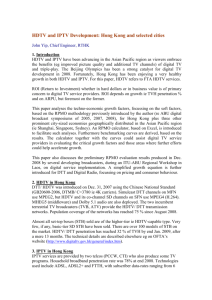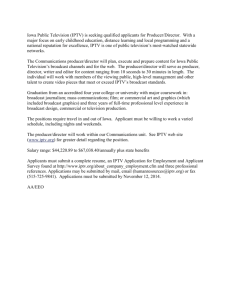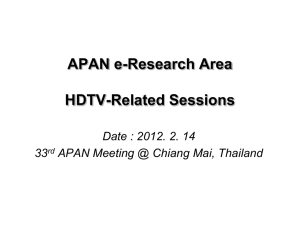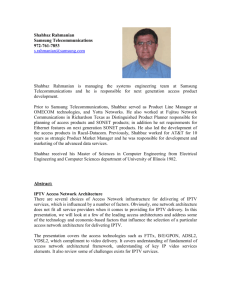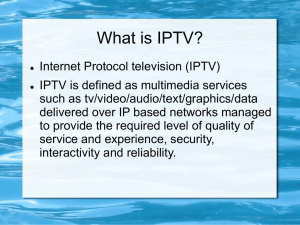HPTV and IPTV Development : Hong Kong and selected cities
advertisement
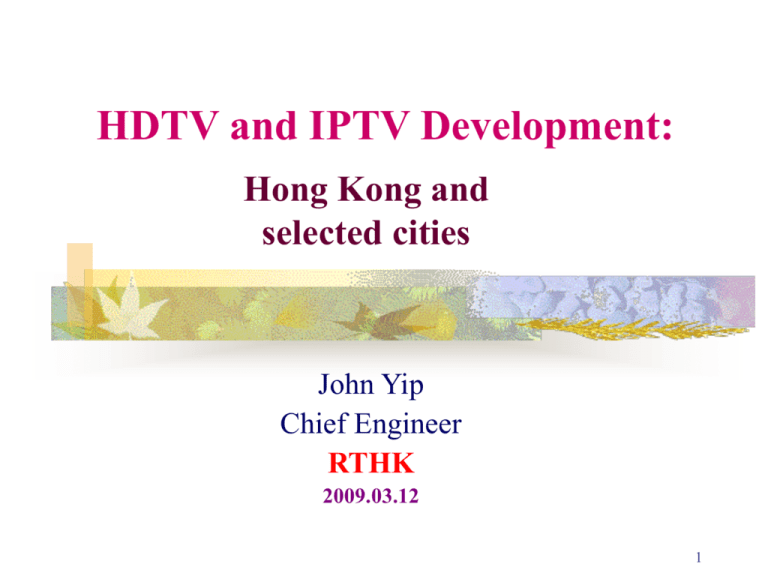
HDTV and IPTV Development: Hong Kong and selected cities John Yip Chief Engineer RTHK 2009.03.12 1 1. Introduction (1) HDTV and IPTV are advancing in the Asian Pacific region Viewers embrace the benefits of Digital TV and Triple-play eg improved picture quality and additional TV channels. Hong Kong: enjoying a very healthy growth in both HDTV and IPTV. For digital TV service providers, ROI (Return On Investment) is a primary concern. Growth is crucial: no growth => no ROI. 2 1. Introduction (2) To look at the progress in Hong Kong, Shanghai, Singapore and Sydney. To analyse the growth and the underlying factors, an Excel calculator is introduced, focussing on the soft factors, based on the RPMO methodology (re ABU digital broadcast symposiums: 2005, 2007, 2008). RPMO calculator + Benchmarking curves have been developed, to assist service providers in evaluating critical growth factors and the areas where further efforts may be required. 3 2. HDTV in Hong Kong DTT channels (simulcast) on MFN HDTV + co-channel SD on SFN MPEG2 MPEG4 (H.264), MHEG5 (middleware) Dolby 5.1 TVB & ATV have been providing the digital TV transmission network services, since Dec. 31, 2007. Population coverage : 75% by early August 2008. DTT/HDTV : 32% of TVH, by end Jan. 2009. 4 2. HDTV/ DTT in HK Basic UHF TV configuration Analog TVB TVB ATV ATV Analog TV MFN TVB TVB ATV ATV SDTV (simulcast, in MPEG-2) HD SFN1 (TVB) SFN2 (ATV) … 1 2 x SD 1 HD + 2 SD MPEG-4, Ch. 35 n 5 SD or MPEG-4, Ch. 37 2 x SD 1 HD + 2SD or HD SFN3 Proposed for Mobile TV, Ch. 47 SFN4 Reserved, Ch. 62 5 3. IPTV in Hong Kong IPTV provided by PCCW, CTI Household broadband penetration rate = 78% (end 2008) Technologies : ADSL, ADSL2+, FTTH, with subscriber data-rates of 6 Mbps 100 Mbps. Bundled prices : highly competitive. Penetration (TVH) : 50% (after about 5 years), averaging a healthy 10% pa. 6 4. Analytical Model (RPMO) (1) Generic growth equation for digital broadcast technology was introduced (in ABU DTV2007) Driving Force (DF) = Function (soft and hard factors) = M (r, p, m, o) * H (G, g) Regulatory (r) Pricing (p) Marketing (m) Driving Force Macroeconomic (G) Geo-physical (g) Others (o) (Technology is reflected in Pricing, Device Attributes and Quality.) 7 4. Analytical Model (RPMO) (2) Soft Factors : more controllable. Hard Factors : more critical in the initial start-up. The soft-factor analytical model, RPMO model, covers Regulatory, Pricing, Marketing, Other factors. 4.1 RPMO Calculator (Excel based) 7 data-entry boxes ie for R, P, M, O (4 sub-factors). For each box, user enters the major issues. For each issue, user enters a weight (0/1/2/3) and a mark (5.0 – 0.0). Marks: for Excellent, Good, Fair, Poor, Bad, No-Go. 8 4.1 RPMO Calculator (1) RPMO Method (Soft-factor evaluation template) Digital Technology = Economy = Date = (Computed data in blue.) R (Regulatory factor) Wt. (0/1/2/3) 1 0 0 0 0 1 mark (5 max., 0 min.) 0.0 0.0 0.0 0.0 0.0 0.0 P (Pricing factor) Wt. (0/1/2/3) 1 0 0 0 0 1 mark (5 max., 0 min.) 0.0 0.0 0.0 0.0 0.0 0.0 M (Marketing/ Promoting factor) Wt. (0/1/2/3) 1 0 0 0 0 1 mark (5 max., 0 min.) 0.0 0.0 0.0 0.0 0.0 0.0 Major issues Major issues Major issues 9 4.1 RPMO Calculator (2) O (Content) Wt. (0/1/2/3) 1 0 0 0 0 1 mark (5 max., 0 min.) 0.0 0.0 0.0 0.0 0.0 0.0 O (Consumer Habits) Wt. (0/1/2/3) 1 0 0 0 0 1 mark (5 max., 0 min.) 0.0 0.0 0.0 0.0 0.0 0.0 O (Device Attributes) Wt. (0/1/2/3) 1 0 0 0 0 1 mark (5 max., 0 min.) 0.0 0.0 0.0 0.0 0.0 0.0 O (Quality) Wt. (0/1/2/3) 1 0 0 0 0 1 mark (5 max., 0 min.) 0.0 0.0 0.0 0.0 0.0 0.0 Major issues Major issues Major issues Major issues Geometric mean for "O" = 0.00 Geometric mean for "R,P,M,O" = 0.00 10 4.1 RPMO Calculator (3) Externalities: Penetration (Growth) Data Total market (eg TVH) (in '000s, approx.) = (enter actual data) 1,000 Years 1 2 3 4 5 No. of subs. (in '000s), approx. 50 100 150 200 250 Cumulative penetration % = No. of years = Average growth/ yr. = 25.0 5 5.0% Penetration 5.0% 10.0% 15.0% 20.0% 25.0% Increase 5.0% 5.0% 5.0% 5.0% 5.0% 11 4.1 RPMO Calculator (4) 30.0% 25.0% 20.0% 15.0% 10.0% 5.0% 0.0% 1 2 3 4 5 (N.B. adjust plot da ta ranges w he re ne cessary by right-clicking the da ta line .) Hard-Factor evaluation (for comparative studies): Hard Factor Remarks HDTV: GDP*(GDP/ capita) For a country, PPP IPTV: GDP/ sq. km For a city, PPP Mobile TV: (GDP/capita) * T For a city, PPP References: http://www.rthk.org.hk/mediadigest/20070614_76_121465.html http://www.rthk.org.hk/mediadigest/20060316_76_120867.html http://www.rthk.org.hk/mediadigest/20061214_76_121247.html http://www.rthk.org.hk/mediadigest/20080315_76_121785.html 12 4.1 RPMO Calculator (5) The time-span under consideration is important. Choose either the entire growth history (past years) or just the most recent year. The major issues within one soft-factor are inter-related so an arithmetic mean is used. R, P, M, O : relatively independent, hence a geometric mean is used. 13 4.2 Major Issues, HDTV (1) Regulatory, R High spectrum availability Liberal spectrum licensing/ allocation Liberal cross-platform content policy Definitive timeframe for analog-off High HD quota required of broadcasters 14 4.2 Major Issues, HDTV (2) Pricing, P Pricing of HDTV receiver and installation Marketing, M Strong viewer education Strong promotion by the industry 15 4.2 Major Issues, HDTV (3) Other, O Content: Large volume of HD programming Compelling HD content eg major events Consumer Habits: Strong TV viewing habit (based on h/ wk) Identifiable major viewing preferences 16 4.2 Major Issues, HDTV (4) Device Attributes: High availability of iDTV, STB and LCD/ PDP EPG and subtitling Ease of use of HD receiving equipment Interactivity and recording Quality: Comprehensive and strong signal coverage Picture Quality (based on Mbps, MPEG2/ H.264) 17 4.2 Major Issues, HDTV (5) Example : “Good” conditions for a mark of “4” are : - Mostly-free cross-platform content-flow (eg between FTA and cable/satellite, no policy favouring the latter). - Well-defined analog-off timetable. - HD quota of 21 hours/ week or more. - Initial HDTV consumer outlay (set + installation + subscription) at <= 2% of GDP/capita. - Average TV viewing of >= 21 hours/ week. - Strong signal coverage of 75% or better. - HD at 15 Mbps or better, preferable on H.264. 18 4.3 Major Issues, IPTV (1) Regulatory, R Liberal IPTV licensing policy. Free-market approach to triple-play. Liberal cross-platform content policy. Pricing, P Pricing of STB and installation. Pricing of annual subscription. Competitive package-bundling, triple-play. Strong anti-piracy protection. 19 4.2 Major Issues, IPTV (2) Marketing, M Strong advertizing efforts by operators Offering attractive promotional packages Free channels offered to subscribers Strong front-line promoting efforts Other, O Content: Large number of channels available Wide range of content categories Exclusive, compelling, premiere content 20 4.2 Major Issues, IPTV (3) Consumer Habits: Strong TV viewing habit (based on h/ week) Identifiable major viewing preferences Device Attributes: Wide range of Set-Top Box features EPG and subtitling; Interactivity and recording Ease of use of STB Quality: Reliability of network service, STB, etc. Picture Quality (based on Mbps and on MPEG2 or 4) Broadband speed (Mbps) for triple-play 21 4.2 Major Issues, IPTV (5) Example : “Good” conditions, for a mark of “4” are : - Mostly-free cross-platform content-flow (eg between IPTV and cable/ FTA and no policy favouring the latter eg exclusivity). - IPTV pricing pa at less than 1% of GDP/capita. - >= 100 TV channels available. - Average TV viewing of >= 21 hours/ week. - Triple-play broadband speed at >= 10 Mbps. 22 4.3 Externalities (1) Influencing factors external to the RPMO model. Hard factors can be externalities. Impact of the Olympics 2008 is included in the analyses as the content has been watched worldwide. HDTV in Hong Kong Pre-existence of an estimated 0.4 M large LCD/ Plasma TV displays. This externality to be discounted in the RPMO analytical model. 23 4.3 Externalities (2) IPTV in Hong Kong Strong anti-piracy protection is reflected as a low/ zero leakage of revenue. GDP/ sq. km is one of the highest in the world due to high GDP/capita and high population density. The high population density allows a fast rollout of IPTV. 24 5. RPMO Analyses :HK, SH, SIN & SYD (1) Table 1: HDTV and IPTV in HK, Shanghai, Singapore and Sydney (estimated data, over the growth years, Jan. 2009) Economies Hong Kong HDTV Shanghai (FTA) IPTV TVH (M) Pen. % Approx. Yrs. Av. % pa Tech. Std. GB206002006, H.264 Remarks For RPMO model, externality is discounted. (HD + 2 SD) in one 8 MHz ch. 2.2 30.9 1 30.9 5 n/a 0.5 n/a GB20600-2006 Started in mid 2008. HD5, started in 11/2007, DVB-T, H.264 is also carried on cable since mid 2008. Singapore 1.1 n/a 1 n/a Sydney 1.5 33.3 6 5.6 DVB-T Hong Kong 2.2 49.5 5 9.9 MPEG2/ H.264 Shanghai 5 15 3 5 H.264 Singapore 1.1 5 2 2.5 H.264 Sydney 1.5 n/a n/a n/a n/a Co-channel SD available from Jan. 2009 onwards. 2 telcos. > 160 SD ch.; HD ch. available. 10.6% growth in 2008 alone. Nationwide and niche licences. Internet TV only. 25 5. RPMO Analyses: HK, SH, SIN & SYD (2) 12 Average Penetration (% p.a.) 10 8 6 4 2 0 0 0.5 1 1.5 2 2.5 3 3.5 4 4.5 RPMO Value HDTV IPTV Aggregate Fig. 1: Benchmarking curves for HDTV and IPTV, based on RPMO analyses 26 5. RPMO Analyses: HK, SH, SIN & SYD (3) Major improvement areas identified: HDTV Affordable HDTV-set prices (prices are falling). Compelling HD content eg major events. Liberal cross-platform content-flow policies. Strong promotion and marketing. IPTV Liberal cross-platform content-flow policies. Exclusive, compelling, premiere content. Large number and range of channels. High broadband speeds and reliability. 27 6. ITU-ABU Workshop in Laos (1) Workshop on digital services implementation, Dec. 2008, Vientiane, Laos. Preliminary results were produced by the participants; RPMO values for Digital Radio, DTT and Digital Cable TV ranged from 3.2 to 3.9. For DTT (ie SD) and Digital Radio, a simplified growth equation is postulated, by factoring GDP/capita into the P (pricing) factor, ie consumer outlay being considered as % of GDP/ capita. 28 6. ITU-ABU Workshop in Laos (2) Driving Force (DTT / Digital Radio) : DF = R*P(GDP/capita)*M*O What the consumer may pay for a DTT or DAB/ DRM receiver may be assessed, by using a benchmark price from an economy welladvanced in the concerned technology eg DAB. 29 6. ITU-ABU Workshop in Laos (3) For Economy under consideration Price A = Price B *(ratio of GDP/capita)*(ratio of consumption, h/week) Benchmark economy where consumption = TV viewing (for DTT), or radio listening (for Digital Radio). Pricing equation is subject to the consumer’s consideration of Opportunity Cost and possibly to the micro-economic Principle of Utility Maximization 30 6. ITU-ABU Workshop in Laos (4) Principle of Utility Maximization : MU1/ P1 = MU2/ P2 = MU3/ P3, etc. where MUi and Pi are the marginal utility and price of good i (eg a DTT STB or DAB receiver) respectively. 31 7. Summary HDTV and IPTV are changing the TV-viewing landscape in the Asian-Pacific region. Broadcasters/ telcos are vitally concerned about Growth following a rollout, as ROI depends firstly on market penetration. The application of the RPMO model is exemplified by analysing HDTV and IPTV in Hong Kong, Shanghai, Singapore and Sydney. The Excel-based RPMO calculator is freely available, to facilitate analyses of digital TV development. 32 Our Target: GROWTH but .. Get Rich Only-if We Try Hard. IPTV Development HDTV Development Digital TV Development Mobile TV Development Searchable on Google, etc. (Use slide show and to animate.) 33
